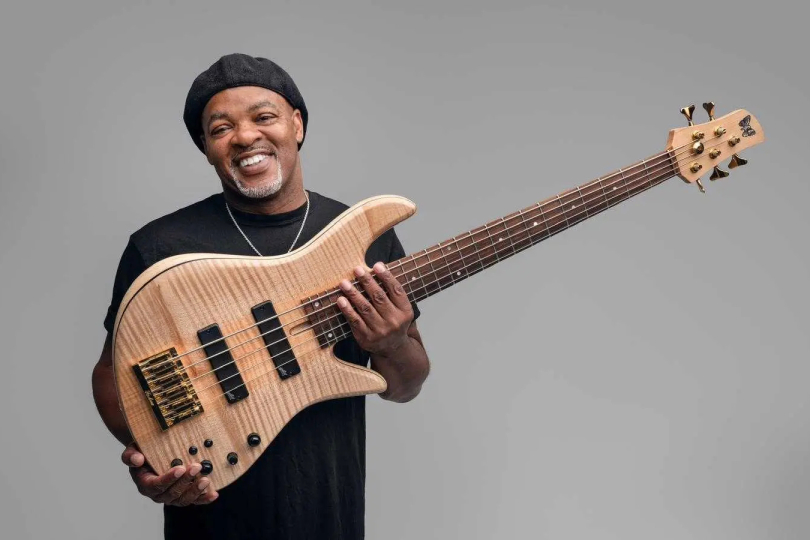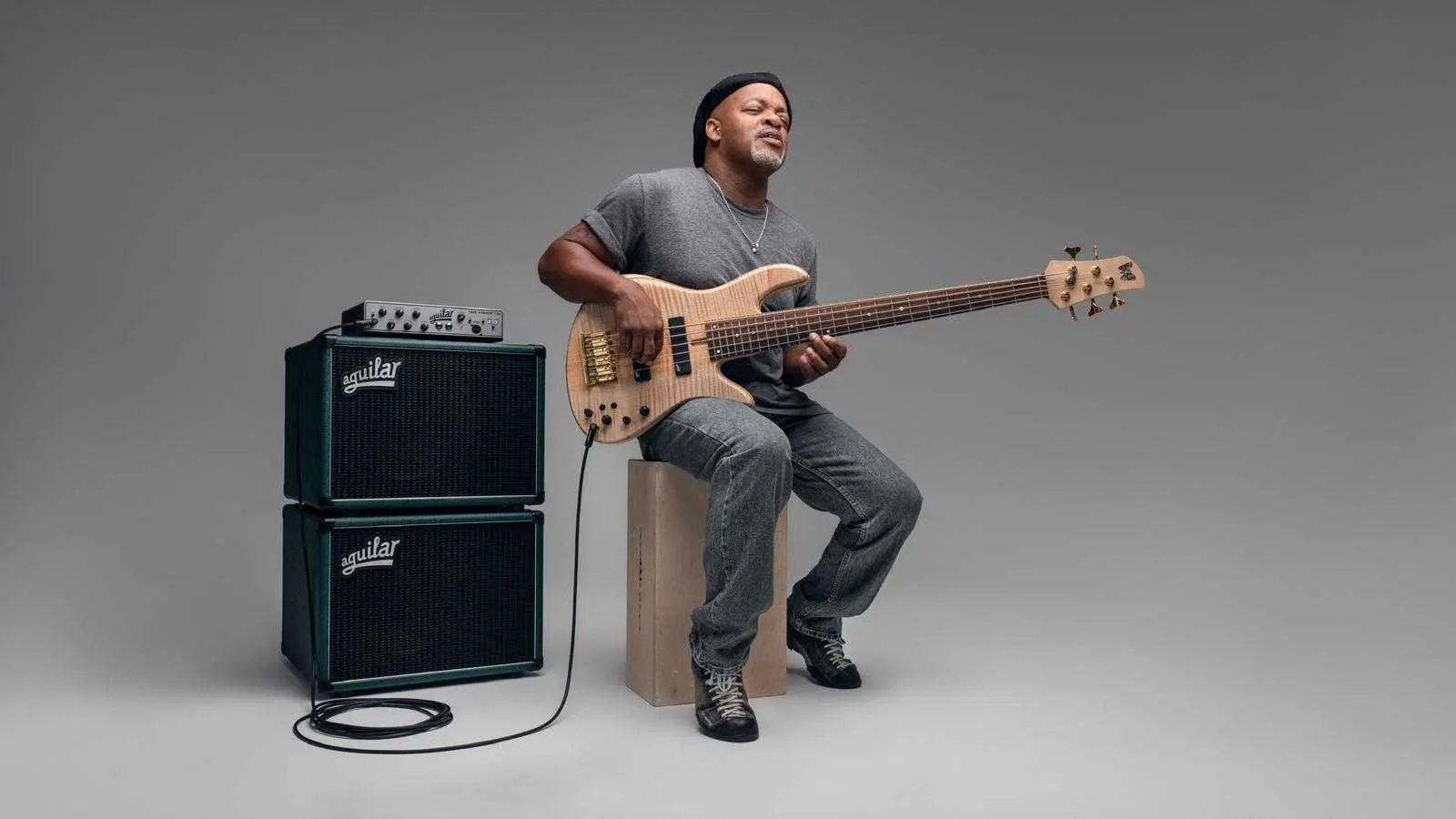
Anthony Wellington: We Should Fall in Love with Talking through Our Instrument
He is considered one of the most sought-after bass teachers, a relentless innovator of playing techniques and a bit of a bass psychologist. Anthony Wellington imparts practical playing skills, theory and general music appreciation to his students through the platform Bassology. He teaches groups at music clinics, masterclasses and workshops around the world, including Berklee College of Music, Musicians Institute, Atlanta Art Institute, Stanford University, Gerald Veasley's Bass Bootcamp and more. This longtime holder of the prestigious position of second double bassist in Victor Wooten's band is bringing his clinic to Prague on the 3rd and 4th of October as part of Bass Week.
Hi, Anthony, it's a big pleasure to meet you this way and I'm really looking forward to welcoming you to Prague in October.
It's nice to meet you too, I'm really looking forward to meeting you in person and all your coworkers. Prague is one of my favourite cities on the planet. And I'm not just saying that.
Thank you! Let’s start with your career as a bass player. When did your interest in music begin?
The hierarchy is a musician first, then a bass player. So I'll go back a little bit further because I think it's easy to get hyper-focused on the bass, but music is the big picture. I grew up in a musical family and none of us were musicians, but we were really musical. We sang in church, we listened to a lot of music. My family had a lot of parties when I was growing up. So there was always music.
And what was your way to the bass guitar?
I got interested in bass really early, in the early 70s, mostly because of R&B music, what we referred to as black music. The R&B music was driven by the bass, so it was the predominant instrument in the music I grew up listening to. Unlike rock'n'roll, where the predominant instrument is the guitar, in the R&B and funk it is the bass. So I was always hearing bass. So in my mind, I was already introduced to bass before I started playing it.
When did you start playing?
I was always aware of the sound. I always loved the sound of it. And I started playing really young, probably around 13. I didn't have a bass, but a neighbor had a bass. Actually, my oldest sister's boyfriend had the bass, but he wasn't playing, so he let me play that and I just fell in love with the instrument and I started studying on my own. So I really never had a bass teacher.
Even at school?
When I went to college, I studied music but I never really had a bass teacher. I did a lot of studying on my own though and I think it's just as valuable. I had a lot of friends who played bass and we would trade ideas and the older guys would show me stuff but I'm mostly self-taught, probably about 95% self-taught. And when I went to high school, I met a music teacher who was not a bass player, but a vocalist and keyboard player. My biggest introduction to music and understanding how music works came from a non-bass player. So what people really know me as is a a bass player, but unconsciously, what they really know me as is a musician. So I credit her as much as I credit any bass player, or probably even more. She's probably the reason why I'm a full-time musician right now and we still stay in touch.
How would you describe your teaching style?
I think talking is a good analogy to learning a musical instrument. When we first learn how to talk, we're mimicking our parents. And our parents respond to us mimicking them with smiles. So we just keep talking. That's how we learn how to talk. But we don't learn how to talk by giving a two or three-year-old a grammar book. And so first we learn how to talk and we learn the basics of knowledge just from speaking to our family. And then maybe three or four years later we start kindergarten and then we start getting the basics of grammar. So, the grammar is analogous to music theory. I believe that when you first start playing an instrument, one of the things you shouldn't consider is signing up for lessons right away. We should just fall in love with talking with the instrument, you know, making sound with it, just like we do with our voice.

So you think we don’t have to study grammar? I mean music theory?
We don't have to start studying grammar for a while. It is not a problem that we don't study right away. But the problem is that we wait too long to start studying because a lot of people have been playing for 5, 10 or 15 years before starting to learn the basics. And then you're in a different mindset. Because when you're young, when you're 5 to 18, you're in the mindset of learning and digesting a lot of information. And when you get to be in your 40s and 30s, you're out of that mindset and you start thinking stuff is hard. But it's not really hard.
Is music theory not hard?
When you start, you think learning music theory is hard, but it's not hard. It's just that you're in a different mindset. You know, when you're a kid, you have this thirst to know stuff and you want to know grammar. You want to know how language works, you want to learn. We want to learn the alphabet first, and we focus only on the alphabet. When you're teaching kids the English alphabet, they're only focusing on that, they're not focusing on spelling words. But when you're an adult and you're learning, you might have an idea of what might be coming and that could be a good thing. But a lot of times it's a bad thing because you want to focus on stuff that's more advanced than where you are. So you might have a teacher trying to show you the proper hand position and the notes on the bass, but you know that some more advanced stuff exists and you want to go straight to that. The kids are better at learning because they just want to focus on the task at hand and not the stuff that we see our heroes do down the line.
So what is your teaching philosophy in comparison with other teachers?
I actually have no clue at all what other teachers are doing. It's not my concern. I've been doing this for a long time, 30 years, so I'm not worried about what some 21-year-old is doing in his teaching and I don't mean it with any kind of arrogance. But I have a curriculum that works and a lot of people are learning my curriculum to teach. I teach you a curriculum that's tailored to you. So since I've got around 70 to 80 students, I really have about 70 to 80 curriculums, and that's been effective for me for 30 years. So, when I'm focusing on a student, I shape that curriculum to fit that individual student. So I'm teaching you, and then I teach your best friend another day. I'm not teaching you guys the same thing.
Can you give me an example?
I might have five ways to explain intervals, and one of those five ways may resonate with you and stick with you, but that way may not resonate with somebody else. And with all of the humility I can muster, I actually don't even care about what other people are doing because the content that I'm focusing on has been around for hundreds and hundreds of years. You know, I didn't invent modes. I found a new way to teach them. I didn't invent intervals or rhythm. I just found ways to teach them. So the stuff has already been available and in this day and age of the Internet, a lot of people have access to other people's curricula. So I know a lot of my lessons show up in a lot of other people's lessons, and I'm not upset about that. I actually welcome that because I know it's good stuff.
Is there anything that students came up with? Some ideas you have learned from them?
I always say I'm in a fortunate position because I do think of all my students as teachers – because they're teaching me how to teach. But I learn from all musicians, not just my students. You know, when I go hear any musicians play, I get ideas, and I might get an idea that they're not even presenting. I may just get an idea from observing them. Even from observing them do something wrong. And I'm open and receptive to that because it's really important to me to know how people learn. So all of my students teach me and show me how people learn and that's what makes me a better teacher.
So how can a person become great at something?
Becoming great at something is always the same mechanism. We're applying it to the bass and when I come to Prague, that's what we will be focusing on. It is really just about understanding how to present information and how to practice it. You know, study it and hopefully make it a lifelong endeavour. A whole lot of my friends started playing when I started playing at the age of 13 and a lot of them were really good and most of them don't play anymore. And I think one of the ways to achieve greatness, if we want to use that word, is not to change your mind about something. And I've just never changed my mind about the bass and music. But I did change my mind about some things because I wanted to be a policeman. I wanted to be an astronaut. So I'm not saying I'm perfect. There were some things that I wanted to be that I changed my mind about. And I think that's true for everybody. And I think it's also true for everybody that there are some things they just didn't change their mind about. For me, it was music first and then bass. I'm not good because I have special gifts or any more gifts than anybody on the planet. I work hard. I have a good work ethic when it comes to playing and studying music. But mostly, I didn't change my mind.
If you have found an error or typo in the article, please let us know by e-mail info@insounder.org.

